Michael In Ireland Cyber Pub | home
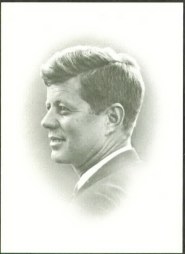
John F Kennedy

Kennedy Homestead Wexford Ireland
The Kennedy Homestead, birthplace of President John F. Kennedy's great-grandfather Patrick Kennedy, celebrates the story of five generations of the Kennedy dynasty and is still today farmed by his descendants.
Joining the multitudes of Irish fleeing the Great Famine, Patrick Kennedy departed from this Homestead for the port of New Ross on a wet day in 1848 to set sail for the United States where his descendants were to become the worlds most famous family.
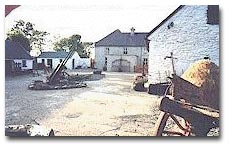
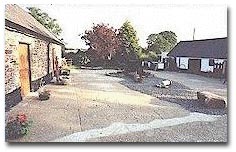
The Kennedy Homestead is a unique Cultural Museum and Visitor Centre, celebrating this family history like no other.
The Centre graphically illustrates a story of epic proportions, full of triumph and tragedy. Moving from steerage on an immigrant vessel to
the slums of Boston, from the Court of St. James to the White House, and the golden era Americans refer to as "Camelot".
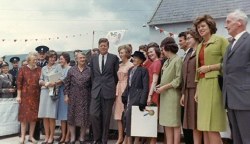
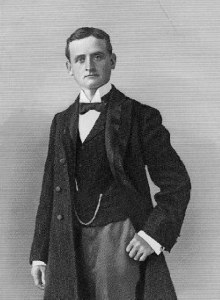
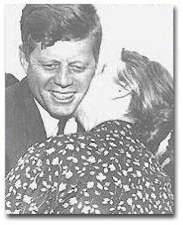
John F Kennedy Irish Relations JFK Grandfather His Cousin Mary Ryan
Facilities at the Homestead Include
The Visitor Centre with its unique collection of John F. Kennedy memorabilia, Audio-Visual Display, Souvenir Shop, Picnic Area, Toilets, Wheelchair Access and extensive Car and Coach Parking facilities.
The Legacy
The Kennedy family legacy is an integral part of daily life in Co. Wexford. The achievements of a distinguished family are celebrated in three heritage sites - The Kennedy Homestead, The Emigrant Ship "Dunbrody" and the JFK Arboretum. From humble beginnings the Kennedy family typified the indomitable Spirit Of Ireland venturing from Dunganstown to New Ross and onwards to a glorious life in the New World.
The John F Kennedy Trust was established in 1988 to perpetuate the legacy of the President. It does so by playing a leading role in the community life of New Ross and the surrounding district thereby enriching the lives of the people of Co. Wexford.
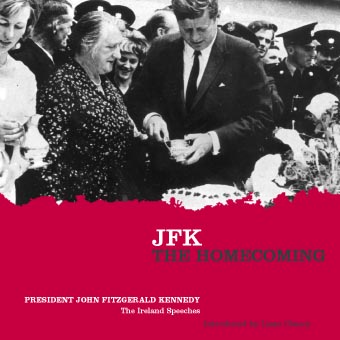
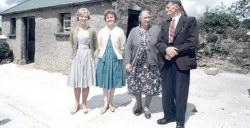 JFK With Irish Cousins
JFK With Irish Cousins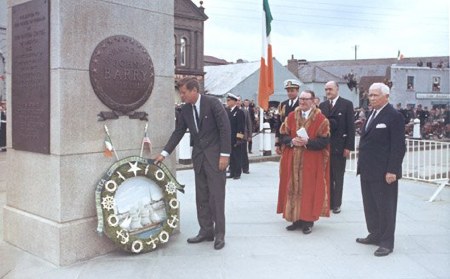 Picture taken in Wexford Ireland 1963
Picture taken in Wexford Ireland 1963 US Navy Founder Commodore John Barry
John Kennedy
On November 22, 1963, when he was hardly past his first thousand days in office, John Fitzgerald Kennedy was killed by an assassin's bullets as his motorcade wound through Dallas, Texas. Kennedy was the youngest man elected President; he was the youngest to die.
Of Irish descent, he was born in Brookline, Massachusetts, on May 29, 1917. Graduating from Harvard in 1940, he entered the Navy. In 1943, when his PT boat was rammed and sunk by a Japanese destroyer, Kennedy, despite grave injuries, led the survivors through perilous waters to safety.
Back from the war, he became a Democratic Congressman from the Boston area, advancing in 1953 to the Senate. He married Jacqueline Bouvier on September 12, 1953. In 1955, while recuperating from a back operation, he wrote Profiles in Courage, which won the Pulitzer Prize in history.
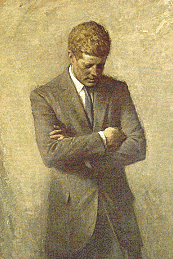
In 1956 Kennedy almost gained the Democratic nomination for Vice President, and four years later was a first-ballot nominee for President. Millions watched his television debates with the Republican candidate, Richard M. Nixon. Winning by a narrow margin in the popular vote, Kennedy became the first Roman Catholic President.
His Inaugural Address offered the memorable injunction: "Ask not what your country can do for you--ask what you can do for your country." As President, he set out to redeem his campaign pledge to get America moving again. His economic programs launched the country on its longest sustained expansion since World War II; before his death, he laid plans for a massive assault on persisting pockets of privation and poverty.
Responding to ever more urgent demands, he took vigorous action in the cause of equal rights, calling for new civil rights legislation. His vision of America extended to the quality of the national culture and the central role of the arts in a vital society.
He wished America to resume its old mission as the first nation dedicated to the revolution of human rights. With the Alliance for Progress and the Peace Corps, he brought American idealism to the aid of developing nations. But the hard reality of the Communist challenge remained.
Shortly after his inauguration, Kennedy permitted a band of Cuban exiles, already armed and trained, to invade their homeland. The attempt to overthrow the regime of Fidel Castro was a failure. Soon thereafter, the Soviet Union renewed its campaign against West Berlin. Kennedy replied by reinforcing the Berlin garrison and increasing the Nation's military strength, including new efforts in outer space. Confronted by this reaction, Moscow, after the erection of the Berlin Wall, relaxed its pressure in central Europe.
Instead, the Russians now sought to install nuclear missiles in Cuba. When this was discovered by air reconnaissance in October 1962, Kennedy imposed a quarantine on all offensive weapons bound for Cuba. While the world trembled on the brink of nuclear war, the Russians backed down and agreed to take the missiles away. The American response to the Cuban crisis evidently persuaded Moscow of the futility of nuclear blackmail.
Kennedy now contended that both sides had a vital interest in stopping the spread of nuclear weapons and slowing the arms race--a contention which led to the test ban treaty of 1963. The months after the Cuban crisis showed significant progress toward his goal of "a world of law and free choice, banishing the world of war and coercion." His administration thus saw the beginning of new hope for both the equal rights of Americans and the peace of the world.
For more information about President Kennedy, please visit
John F Kennedy Quotation
And so, my fellow Irishmen ask not what your country can do for you - ask what you can do for your country. My fellow citizens of the world: ask not what America will do for you, but what together we can do for the freedom of man.


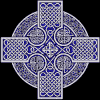
John F. Kennedy Junior's Irish Legacy
(by Niall O'Dowd, Ireland on Sunday) 25/7/99
This is a true story. A few years back when John F. Kennedy Jr. was an Assistant District Attorney in New York he received a letter from an Irish farmer which stated in part, "I am coming to the United States for a visit. I will die a happy man if I could shake the hand of the son of President Kennedy."
Kennedy received thousands of letters every year seeking appointments, but for some reason this one grabbed his attention and he agreed to meet. "On the day in question an old guy showed up in his best polyester suit with a very broad tie stretching down below his belt buckle" remembers a former Kennedy colleague. " He walked in the door, pulled out a picture of the dead president out of his back pocket and handed it to John to sign. When John did so, tears welled up in the old man's eyes.
"He then pulled an Irish linen tablecloth out of his bag and handed it to John who accepted it gracefully. The man then took out his instamatic camera and snapped numerous shots. He went back happy to Ireland with pictures of himself and the son of John Kennedy."
Such was the appeal of young Kennedy to many Irish. It was no surprise then that the Irish community in New York were not about to forget him in his tragic hour this week. A Memorial Mass for John Kennedy Junior, his wife Carolyn and sister-in-law Lauren Besette was celebrated on Thursday at 6 p.m. at Old St. Patrick's Cathedral on Mott Street in Manhattan. There in the old cathedral where generations of Irish not long off the famine ships worshipped, the memory of the most famous Irish emigrant family was rekindled and their latest tragic loss commemorated.
According to the celebrant, Fr. Colm Campbell, a Belfast native, the Mass was a small token of the esteem the community held for the man who died so tragically. Among the poems read on the evening was the lament to Eoghan Rua O'Neill - "Why did you leave us Eoghan, Why did you die" which was widely quoted when President John F. Kennedy died.
Though he was never front page material on Irish issues, John Kennedy Junior nonetheless was becoming more interested in his roots. He is, of course, descended from Patrick Kennedy, a peasant farmer in Wexford who was destined to become Ireland's most famous emigrant.. Patrick left Ireland in 1848 to escape the Famine and traveled to Boston. In Boston, he became a cooper and was active in politics and the fight against anti-Catholicism.
In September of 1849 he married Bridget Murphy, a neighbor from home. His son Patrick became a successful businessman, and it was his son, Joseph Kennedy, who created the Kennedy fortune.
John Kennedy Junior visited his ancestral home in Dunganstown in 1967. "He ran in from the farm saying there was electricity in the grass, and all because he got stung by the nettles," his Irish cousin Patrick Grennan told The Irish Times this week. "Jackie Kennedy wanted him and his sister Caroline to see the land where their family came from. She visited the homestead and then sent the children back the next day barefoot to experience authentic farm life."
Kennedy may have been about to relive those links again. According to family sources, John and his sister Caroline had kept closely up to date with the reconstruction of the Famine ship Dunbrody, which was set to sail to America from Wexford next year. Though it was still too early to have definite evidence, there was a belief that John Junior himself would be part of the voyage recreating that of his great-great grandfather over a century and a half ago.
His most notable contribution on Irish issues was a lengthy interview he carried out with Sinn Féin president Gerry Adams during a visit to Ireland in June of 1997 for his George magazine. As part of that visit, Kennedy attended the funeral of Patrick Kelly, an IRA prisoner who had died in a British jail when his cancer was diagnosed too late. Kelly was buried in the Irish Republic, and the following day John Junior took the train to Belfast and was met at the central station there by Richard and Chrissie McAuley, two Sinn Féin representatives.
For the next seven hours, they showed the son of the former President around the city in order to prepare him for his interview. "First we went to the Markets area, where by coincidence a large number of British troops had begun patrolling the area," says Richard McAuley. "Because this was a time between the two IRA ceasefires, there was lots of British Army activity for Kennedy to witness."
Later he went with the McAuleys to Milltown Cemetery to view the graves of the Irish hunger strikers whose deaths in 1981 had effected such a huge transformation both within Irish Republicanism and how it was viewed from the outside.
"I remember Kennedy remarking how young they were when they died," says McAuley, "and how tragic the loss of so many men had been." They also visited the Felons Club in West Belfast, where Kennedy had the obligatory pint of stout in the company of many ex-IRA prisoners.
In his article in George the following month, Kennedy proved to be no pushover for Sinn Féin. His questions were tough and very well informed. He drew the analogy between the South African peace process and Northern Ireland, and told the story about the Northern Ireland delegation including Sinn Féin and the Unionists that went to South Africa for a conference. One of the biggest Unionist complaints during the visit was that Sinn Féin had been given a better cocktail bar. "My God, we were never this bad," Kennedy quotes a senior ANC officer as saying.
Adams had also met Kennedy previously in New York during one of his visits here, and they spent several hours discussing the Northern Ireland issue. "Kennedy seemed to see it in terms of what happened in the 1960s in the south," said a Sinn Féin member who was present.
Apart from his interest in Northern Ireland, Kennedy had one other major Irish interest -- acting in Irish plays. He made his New York stage debut at the age of 24 in October of 1985 at the Irish Arts Center in Manhattan. He played the part of a young man who got his girlfriend pregnant in the Brian Friel play Winners. The show ran for six nights of private performances and was well received by its audiences. In a sad and ironic twist, the play's ending includes Kennedy's character and his girlfriend drowning and washing ashore.
There are eerie similarities between the play and the real life tragedy. In the play the couple are lost at sea for three days before their bodies are found - the same length of time that John Kennedy and his wife were missing.
Although the center made no attempts to publicize the play, a mention in Liz Smith's gossip column in the New York Daily News touched off an avalanche of coverage, including lead stories in both the Daily News and the New York Post, and articles in Newsweek and People.
According to James Flannery, professor of theater and drama at Emory University in Atlanta who had heard of Kennedy's talent when he was a student at Brown University, John was a natural actor who could have been among the greats if he had decided to pursue an acting career. Nye Heron, manager of the Irish Arts Center at the time Kennedy acted there, agreed. Calling Kennedy's instincts as an actor "fantastic," Heron told Irish America magazine at the time that John Junior had "the best Irish accent of any young American actor I've seen."
Kennedy was a frequent attendee at Irish events. He was present for the inaugural luncheon announcing Ireland House, the New York University center for Irish studies, in 1991. (The center was opened in 1993). He also attended several meetings of the National Committee on American Foreign Policy when they held forums on Northern Ireland, most recently when Gerry Adams addressed the group two years ago.
His untimely death will revive many tellings of the alleged Irish curse that hangs over his family. But the reality is that John F. Kennedy Junior accomplished more in his short life than many will in a lifetime.
Starting a magazine, for instance, which he did with George, a political monthly, was no rich kid's idle pursuit. He brought its circulation over the 400,000 mark and proved himself a savvy publisher in a business where new magazines have a 90% failure rate.
In addition, he quietly helped dozens of worthy charities, continuing the Kennedy notion of public service. As for a future political career, many New York insiders believed he would have run for governor in 2002 when the current occupant, George Pataki is out of office.
That is all useless speculation now. What is true, is that throughout his life he retained an affection for his Irish roots and was loved in turn by many Irish who this week have been in mourning for the man who represented the most extraordinary family ever to leave Ireland's shores. In a strange way John Jr's death merely strengthens the bond between the two.
John F Kennedy Speech to the Irish Parlamend Dail-Dublin June 28 1963

